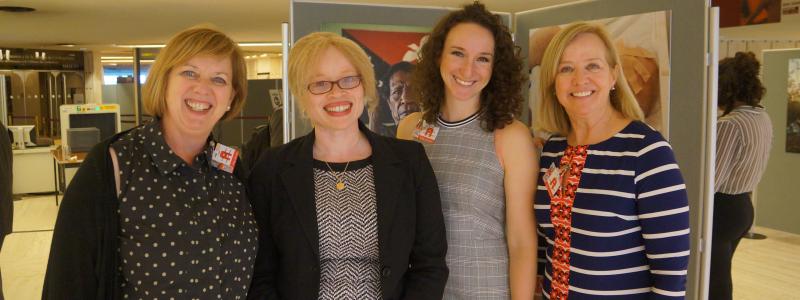Trinity Western University Nursing Professors Dr. Sheryl Reimer-Kirkham and Dr. Barb Astle have returned from Geneva, Switzerland where they lead a Roundtable on Human Rights and Albinism in conjunction with the 39th session of the United Nations Human Rights Council. The first event of its kind, this meeting brought together 32 scholars, decision-makers, and advocates from ten countries to set a clear direction for field research on the human rights abuses suffered by people with albinism.
Drs. Reimer-Kirkham and Astle were approached three years ago by Ikponwosa Ero, a human right lawyer and a person with albinism who serves as the UN Independent Expert on the Enjoyment of Human Rights by Persons with Albinism and works with the albinism-advocacy organization Under the Same Sun, about the need for research to help draw attention to albinism and human rights issues.
Albinism, a genetic disorder that causes a lack of pigmentation in skin, hair, and eyes, leaves individuals vulnerable to visual impairment and at increased risk of skin cancer. People with the condition everywhere face stigma and discrimination. In certain regions of Africa; however, their prospect are more dire, where deeply rooted spiritual and cultural beliefs that link albinism to evil and misfortune persist.
“We were successful in receiving funding from the Social Sciences and Humanities Research Council (SSHRC) to pull together an international research-policy-advocacy network, and Ero made the arrangements for us to host the event in conjunction with the UN Human Rights Council, to bring international visibility to the cause,” says Dr. Reimer-Kirkham.
Without a coordinated, sustained and multi-sectoral approach, persons with albinism could continue to be at risk for human rights violation. Bringing about meaningful and lasting change needs to involve academic research, policy and government changes, and public education to breakdown civil society, explains Reimer-Kirkham.
“We think the research we’re conducting will provide much needed findings to support the mandate for Ikponwosa Ero to ensure that human rights policies are implemented so that persons with albinism can live a full life without fear of being persecuted and further stigmatized,” says Dr. Barbara Astle.
The Roundtable brought together key stakeholders to discuss how researchers, advocates, and decision-makers can work together to address this problem.
This research is an opportunity to play a role at the junction of human rights and faith,” says Dr. Reimer-Kirkham.
“As researchers, our intention is always that our results will have an impact,” says Dr. Astle. “When Ikponwosa Ero first approached us and told us about the atrocities inflicted upon persons with albinism, specifically in parts of Africa, we were personally moved to collaborate with her.”
ALBINISM STATISTICS
In Europe and North America it is estimated 1 in every 17,000 to 20,000 people have albinism. However, in Africa the rates are much higher with estimates of 1 in every 5,000 to 15,000 people. In Tanzania in particular, 1 in every 1,400 people have albinism and 1 in 19 people carry the gene, making numbers more than 14 times higher than Europe and North America.1
RESEARCH TEAM:
Dr. Sheryl Reimer-Kirkham (Principal Investigator, TWU Nursing)
Dr. Barbara Astle (Co-Principal Investigator, TWU Nursing)
Ikponwosa Ero (UN Independent Expert on the Enjoyment of Human Rights by Persons with Albinism)
Dr. Lori Beaman (Co-Investigator, University of Ottawa)
Dr. Bonny Ibhawoh (Co-Investigator, McMaster University)
Dr. Wisdom Tettey (Co-Investigator, University of Toronto)
Dr. Rick Sawatzky (Collaborator, TWU Nursing)
Duncan Dixon (Collaborator, TWU Nursing)
Kristi Panchuk (Doctoral Student, University of British Columbia)Emma Strobell (Masters Student, TWU Nursing)

